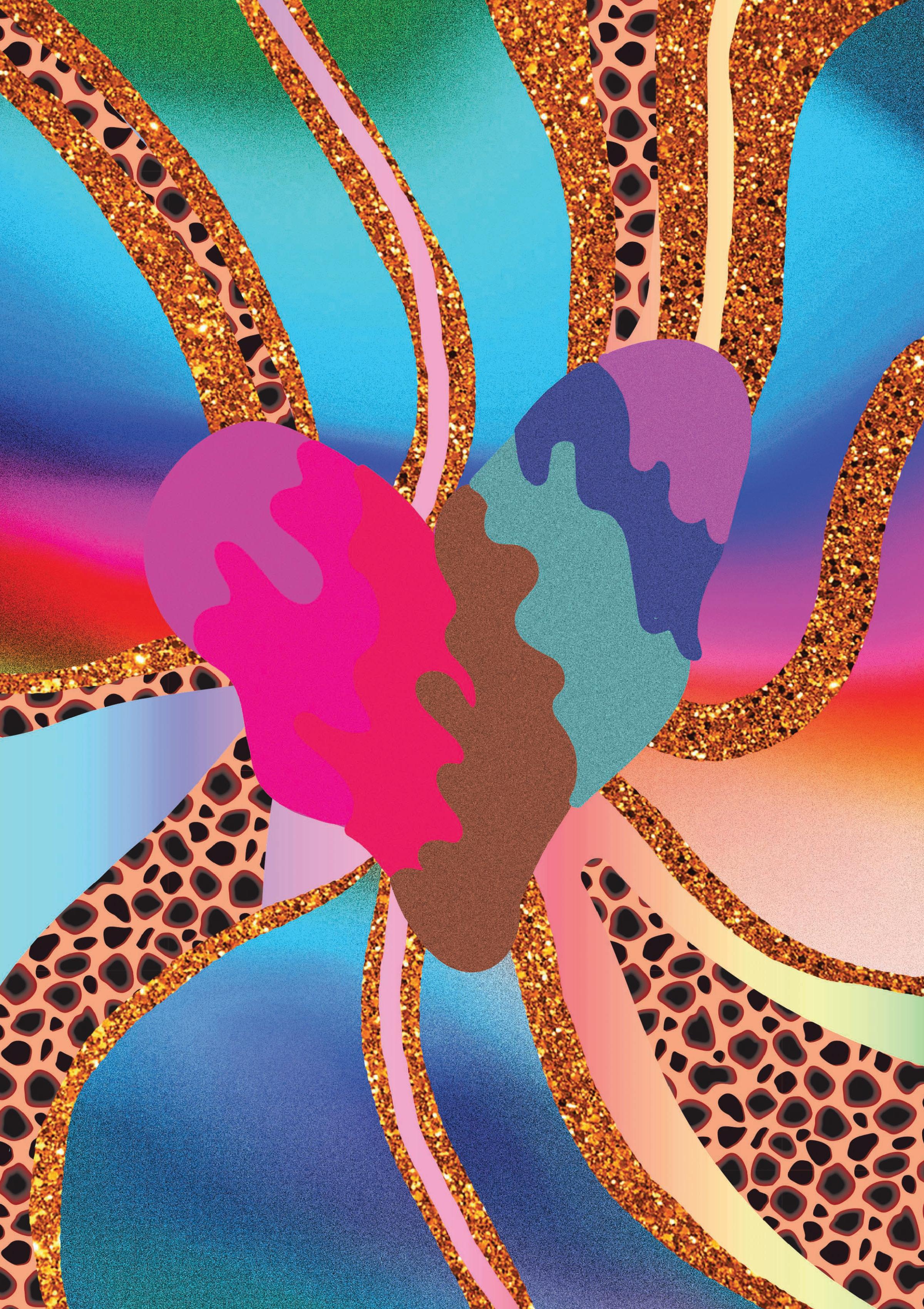
4 minute read
Bimbos, himbos, thembos, and topping the
Edition 33 | 2020 Bimbos, himbos, thembos, and topping the almighty eggplant
Words University of South Australia Rainbow Club Artwork Lucy Edwards
Since the advent of the internet, the lexicon of modern courtship has adapted in some quite unexpected ways through the addition of new words and concepts. While those with a prescriptive view of language as a static, immutable concept decry the onset of new vocabulary conventions as the heralding of a totalitarian nightmare state, the reality is far less frightening. Language has always been fluid and new words expand our vocabulary, rather than being the real-life equivalent of Orwell’s Newspeak—a constructed language designed to reduce a person’s vocabulary and thus take away a person’s ability to illustrate certain concepts. These new words allow us to fill linguistic niches that have been historically left wanting, and nowhere is such an expansion needed than in the oftentaboo subject of sex and romance.
The first among these linguistic innovations comes as a result of the emoji keyboard, which adds a hieroglyphic element to modern text messaging. Our vocabulary has expanded to give flirtatious meanings to these new pictures. At the forefront of these glyphs with amorous connotations is the eggplant emoji, representing a penetrative instrument of sexual congress, biological or otherwise. Convenient as the eggplant might be to suggest shape, lexicographically, us 21st century folk can do better than a simple vegetable as the universal “dick” symbol. We’ve thought about it, and we’ve found an emoji which more than beats it.
At the very least, the champagne emoji equals the eggplant in its representation of the phallus (or other sexual instruments), in that it possesses both length and a bulbous tip. But its connotations more than top the eggplant. Indeed, phallic fruits and vegetables notably feature among emojis generally: banana, carrot, corn, cucumber, mushroom, potato and yam. It’s not hard to get your recommended daily intake if you count emojis.
While such foodie emojis are crudely representative of the variety of shapes and sizes of penises, they all fail to do what the champagne emoji doesn’t: illustrating the
explosivity of orgasm. While sex does not necessarily require the parties involved to achieve climax in order to successfully be a unanimously satisfying experience, an orgasm’s physical and psychological qualities have an undeniable, euphoric quality.
We wish to champion champagne as a more appropriate food-based metaphor for sex. For one, the champagne emoji affords more sophistication in its penetrative metaphor. Its connotations with good cheer and celebration makes sex a thing to be celebrated between partners—an expression of hedonistic pleasure - and what drink embodies the pleasures of life, joyously partaken in by all who consent, more than a flute of bubbles? For the other, one must also bring into consideration the accompanying, receiving, peach emoji. Because with it—and not the eggplant—can come-ons based around the peach bellini be made. Other dick emojis include the hot dog, joystick, and cricket bat, but they too fail to convey the same extent of euphoric pleasure.
The second innovation we wish to toast is the metamorphosis of the word “bimbo” as it enters the new decade. The word began its life as a slur against promiscuous women, to brand them and broadcast their lack of moral, social, or intellectual value. However, as the sex positivity movement has grown legs and made fishnet-stockinged, stiletto-heeled leaps and bounds in the fight against whorephobia, in fandom spaces on the internet, the word “bimbo” is seeing new life in the form of two new words: “himbo” and “thembo.” These words respectively mean a promiscuous man or masc person, or a promiscuous gender-neutral or nonbinary person.
While the continued use of slurs against “promiscuous” women still remains insidiously pervasive in our society, what we see in the words “himbo” and “thembo” is not the hybrid-like eruption of two new slurs with which to degrade people who like sex. Instead, what we see in those words is something altogether more positive and affectionate. Used in small fandom communities, primarily by people already marginalised in life due to their gender or sexuality, these nerdy enclaves are putting into practice the central philosophy of sex positivity—that there’s nothing wrong with having a lot of great sex.
Language tends to trickle upwards through social strata. Words and phrases often originate in marginalised communities queer communities, lower-class communities, communities that are culturally and linguistically diverse, or communities where all three intersect. These terms become cool and countercultural, and later, are deemed acceptable for broad use by our culture’s trend makers. This linguistic evolution is a time-honoured tradition in English, and it’s thought that now commonplace language attributed to the works of playwrights like William Shakespeare originated from such humble origins. This tradition continues today in the widespread use of slang adopted from the hit show RuPaul’s Drag Race, which in turn originated from the then-maligned ball culture of 1980s New York City.
Much has been said of this linguistic evolution’s more pernicious qualities, such as its contribution to cultural appropriation and continued marginalisation of the cultures from which such language is borrowed. However, alongside these detrimental qualities can also come genuine strides forward in social progression and acceptance. Many people don’t so much as bat an eye at a masculine person in makeup anymore, because makeup is now no longer seen as exclusively female, and by extension inherently frivolous or degrading. Perhaps, likewise, as the words “himbo” and “thembo” become more widely used alongside their sister word “bimbo”, the stigma of promiscuity will slowly dissipate for the people who are most harmed by it.
If you ask us, that’s a future worth raising a glass of champagne to. ☐










